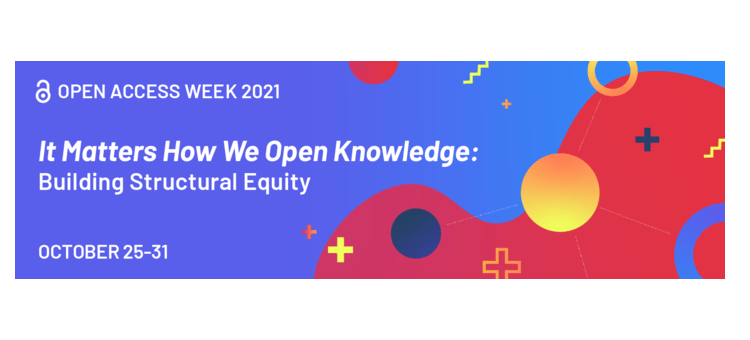International Open Access Week 2021: Move Toward Building Structural Equity With Open Knowledge

As digitization transformed scholarly publishing, it also brought a paradigm shift in the field of knowledge with the advent of Open Access. However, using this emergence to the fullest is not quite possible just yet. While Open Access builds on the objective of barrierless knowledge sharing, do you think that there must be a well-established manner of sharing knowledge? Researchers around the world use open science to make their own research accessible and easily access others’ research. Furthermore, to speak of the constraint that open access currently has, is not being able to reach 100% of publications due to limited or regulated access because of the licenses received to content are either unclear or missing.
With the announcement of this year’s theme “It Matters How We Open Knowledge: Building Structural Equity”, the International Open Access Week intends to align its theme with the recently released UNESCO Recommendation on Open Science. Being held from October 25th through 31st, the organizers will host discussions and take action around this year’s theme whenever is most suitable during the year and to adapt the theme and activities to their local context. Furthermore, in the light of the International Open Access Week, many institutions around the world are organizing free and open events— view all Open Access Week events.
Role of Open Access During COVID-19
Despite the ravaging impact of COVID-19 bringing several industries to a standstill, the publishing industry saw a rampant surge in scholarly publications. What enabled this accelerated sharing of data and research is Open Access. However, in these times, we have learnt an intrinsic aspect of knowledge sharing. As the need for sharing knowledge and the requisite for advancing research and literature is undeniable, one must make a calculated decision as to how is the knowledge being made available to all.
Building Structural Equity with Open Knowledge
As stated by UNESCO Recommendation on Open Science, “Open Science should play a significant role in ensuring equity among researchers from developed and developing countries, enabling fair and reciprocal sharing of scientific inputs and outputs and equal access to scientific knowledge to both producers and consumers of knowledge regardless of location, nationality, race, age, gender, income, socio-economic circumstances, career stage, discipline, language, religion, disability, ethnicity or migratory status or any other grounds.”
The community aims at prioritizing diversity, equity, and inclusion into the streams of the open community. The International Open Access Week brings an exclusive opportunity to initiate and promote new conversations. It helps in creating connections across and between communities. This will facilitate this co-design, and bring in chances of progressive infrastructure for opening knowledge to all.
The Transition of Open Access: Growing Importance of Sharing Knowledge
The exponential growth in Open Access publishing is projected to continue in several countries, such as the UK, on track for 90 percent of their researchers’ output to be published Open Access within a year due to business model and operational innovations. Furthermore, the revised STM Report adopts a new supplement format to be issued in regular thematic updates, reveals significant publisher-driven growth in Open Access and ‘continued dynamism’ in the scholarly communication ecosystem.
Important Aspects of Open Access
Knowledge sharing has gone beyond educating others. It’s now about growing connections and building collegial relations, Improving collaborative and individual performances, and grow stronger as professionals. Here are some important aspects of knowledge sharing:
1. Developing Collective Knowledge to Streamline Processes
Not everyone knows it all. Hence, with every person bringing some knowledge to the table, it benefits individuals, teams, and society at large with expertise that pass from one entity to another. Furthermore, applying this gained knowledge collectively, enables exploration of newer horizons and helps setting higher limits to reach.
2. Sharing Increases Knowledge
Open knowledge and its accessibility to a wider range of audience increases the chances of adding to the shared knowledge. The propensity of newer literature being added to the system is inevitable, either due to review or research,
3. Recognition and a Sense of Purpose
Another importance of knowledge sharing is that it makes your work easily discoverable by other researchers and experts. Seeing others benefit from your knowledge can be a huge deal. Additionally, it gives you recognition as an ethical and authentic researcher within the community.
4. Retention of Knowledge Across the Globe
Restricted knowledge access devoid researchers, policy makers, publishers, etc. to document pertinent literature and work progressively toward research advancement. However, shared knowledge that is openly accessible will help in the growth of literature and research.
While sharing knowledge is a positive, one must remember to share it responsibly. As it is important to document literature ethically, it is also important to disseminate it in a similar way. Researchers must have mutual respect for the integrity of research literature.
As a researcher, what are your views on the ways in which open knowledge is made available to all? How do you think will this year’s Open Access Week theme help in making the system better? Have you published any of your papers on an Open Access platform? What are the possible implications of Open Access to the scientific community? Do you think that the pandemic has had a positive effect on the scholarly publishing industry? Let us know about your experiences with publishing on Open Access platforms in the comments section below! You can also visit our Q&A forum for frequently asked questions related to different aspects of research writing and publishing answered by our team that comprises subject-matter experts, eminent researchers, and publication experts.









